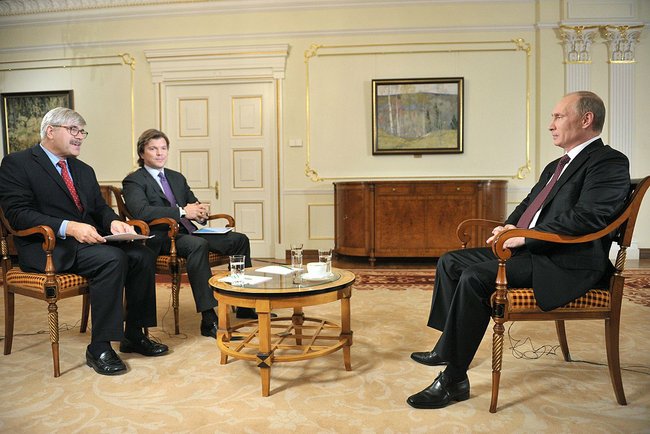We awake to a surprising headline in Russian state news agency RIA Novosti: Путин: Россия не исключает согласия на военную операцию в Сирии (“Putin: Russia Does Not Exclude Agreement To A Military Operation In Syria”.)
In an interview with AP and Russia’s Channel 1 on Tuesday night, Russian President Vladimir Putin said that Moscow would not rule out supporting a United Nations Security Council resolution backing military action against Syrian President Bashar al-Assad, if it were proven that Damascus had used chemical weapons.
Even though Putin continued to assert that it was illogical for the Syrian Arab Army to have used chemical weapons, his remarks about Russia’s support if chemical weapons use were proven is a sea-change from Moscow’s earlier spin on the situation.
The interview, conducted at Putin’s country residence outside Moscow, was the only one the Russian leader granted before the G-20 summit in St. Petersburg opens Thursday.
It is signficant that RIA Novosti — intended for a domestic audience — leads with Putin’s response to the question whether Moscow would support military action if it were proven that the Syrian regime had used chemical weapons: “I do not exclude it.”
The Russian President then said, “Only the U.N. Security Council can authorize force against a sovereign state. Any other motives or methods that would justify the use of force against an independent and sovereign state are unacceptable and can only be deemed aggression.”
However, he returned to his statement of possible intervention:
We would be convinced by a deep case study of the issue and by the presence of evidence which would be obvious and which would clearly prove who acted, and what tools were used. After that, we would be ready to act in the strongest and most serious way.
Previously, Moscow’s line was that if a chemical weapons attack happened, then Syrian insurgents are to blame. But now RIA Novosti quotes Putin as saying that, as yet, there is no precise evidence about what exactly happened:
“We have no evidence about what these chemicals are, it is not known whether it was a chemical weapon, or just some kind of harmful chemical substances, [or] if they were used by the official Syrian government army.”
Putin did put up a hurdle to any commitment to “proof” of Assad’s responsibility. He said that videos of the aftermath of the attacks of August 21 do not constitute evidence, and even suggested that “Al Qaeda” may have faked the images:
The only question is who did what, and who is to blame. These images in themselves do not provide answers to the questions that I’ve just put. And there is the opinion that these are compiled by those same militants who, as we well know and the U.S. administration admits, are linked to Al Qaeda and who have always been known for their extreme cruelty.
[Editor’s note: the full transcript of the interview, issued by the Kremlin, shows that Putin went on to say the following, which RIA does not print:
However, I draw your attention to the fact that, if you take a close look at these images, there are no parents, no women, no medical personnel. Who are these people and what happened? There is no answer to this question. The images themselves are, of course, terrible, but they do not prove someone’s guilt. Of course, this is subject to investigation, and it would be good to find out who committed these crimes.]
RIA also notes that Putin discussed the issue of whether Moscow has supplied Damascus with the S-300 air defense system, saying that the delivery is not complete and that Russia will decide what to do depending on the situation.
State News agency ITAR-TASS is more cautious in its framing. Its headline, Владимир Путин: Россия не собирается и не будет ввязываться ни в какие конфликты за рубежом (“Vladimir Putin: Russia Is Not Preparing To And Will Not Get Involved In Conflicts Abroad”, reiterates that Moscow won’t actively back Assad militarily if the U.S. strikes Syria.
“We have our own understanding about how we are going to act should the situation develop, with the use of force or without. We have our own plans, but it is still too early to talk about this,” ITAR-TASS quotes Putin.
ITAR-TASS then portrays Putin as pleased with the decision of some countries, particularly Britain, not to back military action, . The State agency quotes:
Quite frankly, I was very surprised, because I thought that in Western society everything is done according to the principles of a certain uniformity, like the decisions taken at Communist Party congresses in the USSR…[however] there are people who value their sovereignty, who analyze the situation and work up the courage to make decisions in the interests of their own countries and defend their point of view…It’s very good, it says that the world really is strengthened by its multipolarity.
AP, which conducted the interview, offers fuller quotes from Putin, but does not provide the political spin that RIA Novosti and ITAR-TASS put on the President’s remarks.
The agency also distorts the interview — and thus the portrayal by many in Western media — by mis-labeling its video extract: “Putin Warns West on Syria Actin”.

